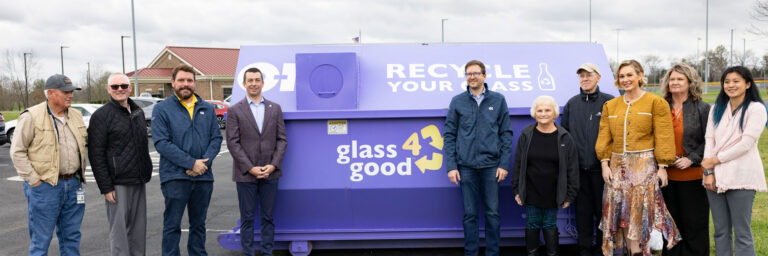O-I’s manufacturing plant in Alloa, Clackmannanshire, Scotland is a beacon of innovation and tradition in the glassmaking industry. The plant also stands out for its visionary approach to workforce development and community engagement through apprentice programs and partnerships with local educational initiatives.
With a history stretching back over almost 275 years, the O-I Alloa plant is a workplace for over 500 people and a living museum of craftsmanship and technological evolution, producing millions of bottles each year for whisky and other beverages.
James Keegans, the UK People & Culture Leader at O-I, encapsulates the company’s forward-thinking ethos:
“At O-I, we’re continually striving for change. The business moves incredibly fast, and we need young people to be part of our diverse workforce to support us with that change,” Keegans said.
This statement reflects a deep-seated belief in infusing the company with fresh ideas and perspectives essential for driving innovation in a rapidly evolving industry.
O-I Plant Programs and Partnerships Crucial in Offering Students Real-World Insight
The team in Alloa is future-proofing the plant through young career programs, apprenticeships, and by working with local schools and young workforce associations.
The Alloa plant offers several programs and partnerships to nurture young talent. The plant leads several apprenticeship and career ready programs. The apprenticeship programs focus on electrical and engineering, with opportunities for apprentices to continue their careers after four years of training. In Alloa’s career ready programs, interactive school visits lead to the recruitment of apprentices, and local students are mentored.
“We are committed to our apprentice program, we welcome and develop about four apprentices each year and train them for four years to become true professionals in their jobs. After they graduated, we typically offer them career opportunities and continuous training to further develop their skills. We also work with local schools, government agencies like DYW (Developing the Young Workforce) here in Scotland but also with career-ready programs locally, with, for instance, employees mentoring local students. These partnerships are a great way to connect with local schools and local learning providers so that we can offer these opportunities for young people,” said UK Operations Leader Susan Lyall.
Lyall said these programs and partnerships are crucial, as they offer students real-world insights and career pathways they might not have considered otherwise.
Michelle Carr, DYW Lead for Clackmannanshire, praised the symbiotic relationship between O-I and educational initiatives, underscoring the benefits of early engagement with students.
“O-I is looking to engage with young people and bring them in from school at an earlier age where they can come into O-I, look around their fantastic premises, and find out about the opportunities available to them,” Carr said.
She explained that this approach not only helps demystify the world of work for students but also aligns their academic learning with practical, career-oriented goals.
A Commitment to the Community: Students, Teachers Find Value in O-I Apprentice Program
The impact of O-I’s outreach and apprentice programs is tangible. Tony Martin, a teacher from Alva Academy, shared his enthusiasm after a recent factory tour, saying, “Today we had a tour of the factory … we did a few tests, and we had a tour of the plant, which was amazing.”
Experiences like these are invaluable for students and educators, offering a first-hand look at the intricacies of modern manufacturing and the myriad roles that support it.
Apprentices like Ross McGhee, a first-year electrical engineer who learned about O-I’s opportunities through his school, Alloa Academy, are a testament to the program’s success. McGhee’s journey from student to apprentice underscores the importance of accessible pathways into skilled trades and engineering fields, areas where practical experience and mentorship are essential to mastery.
O-I Process Engineering Manager Gary Little emphasized the importance and value of integrating young talent into the workforce. “It’s massively important. We’re one of the biggest employers …I don’t think many young people at school understand what being an engineer in our work means to the place, not just to the business. It’s really big. It’s really important for us.”
James Keegans echoed the sentiment and described O-I’s experienced workforce as perfect mentors for the next generation. “We’ve got an extremely talented and experienced workforce here at O-I, and therefore we can provide a fantastic learning environment for young people,” he said.
O-I’s initiative in Alloa is more than a recruitment strategy; it’s a commitment to the community and the glassmaking industry’s future. By investing in young talent through apprentice programs and educational partnerships, O-I ensures the continuation of a skilled workforce and contributes to Clackmannanshire’s economic and social vitality. This blend of tradition, innovation, local commitment, and global perspective makes O-I’s work in Alloa a shining example of how businesses can and should invest in the future.








